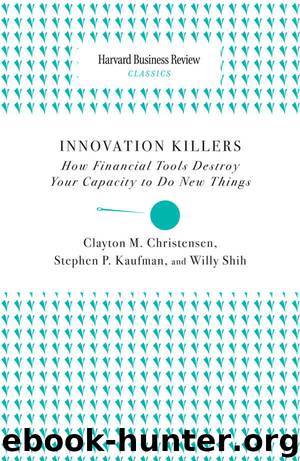Innovation Killers: How Financial Tools Destroy Your Capacity to Do New Things (Harvard Business Review Classics) by Clayton M. Christensen & Stephen P. Kaufman & Willy C. Shih

Author:Clayton M. Christensen & Stephen P. Kaufman & Willy C. Shih
Language: eng
Format: mobi
ISBN: 9781633691308
Publisher: Harvard Business Review Press
Published: 2010-07-21T14:00:00+00:00
FOCUSING MYOPICALLY ON EARNINGS PER SHARE
A third financial paradigm that leads established companies to underinvest in innovation is the emphasis on earnings per share as the primary driver of share price and hence of shareholder value creation. Managers are under so much pressure, from various directions, to focus on short-term stock performance that they pay less attention to the company’s long-term health than they might—to the point where they’re reluctant to invest in innovations that don’t pay off immediately.
Where’s the pressure coming from? To answer that question, we need to look briefly at the principal-agent theory—the doctrine that the interests of shareholders (principals) aren’t aligned with those of managers (agents). Without powerful financial incentives to focus the interests of principals and agents on maximizing shareholder value, the thinking goes, agents will pursue other agendas—and in the process, may neglect to pay enough attention to efficiencies or squander capital investments on pet projects—at the expense of profits that ought to accrue to the principals.
That conflict of incentives has been taught so aggressively that the compensation of most senior executives in publicly traded companies is now heavily weighted away from salaries and toward packages that reward improvements in share price. That in turn has led to an almost singular focus on earnings per share and EPS growth as the metric for corporate performance. While we all recognize the importance of other indicators such as market position, brands, intellectual capital, and long-term competitiveness, the bias is toward using a simple quantitative indicator that is easily compared period to period and across companies. And because EPS growth is an important driver of near-term share price improvement, managers are biased against investments that will compromise near-term EPS. Many decide instead to use the excess cash on the balance sheet to buy back the company’s stock under the guise of “returning money to shareholders.” But although contracting the number of shares pumps up earnings per share, sometimes quite dramatically, it does nothing to enhance the underlying value of the enterprise and may even damage it by restricting the flow of cash available for investment in potentially disruptive products and business models. Indeed, some have fingered share-price-based incentive compensation packages as a key driver of the share price manipulation that captured so many business headlines in the early 2000s.
The myopic focus on EPS is not just about the money. CEOs and corporate managers who are more concerned with their reputations than with amassing more wealth also focus on stock price and short-term performance measures such as quarterly earnings. They know that, to a large extent, others’ perception of their success is tied up in those numbers, leading to a self-reinforcing cycle of obsession. This behavior cycle is amplified when there is an “earnings surprise.” Equity prices over the short term respond positively to upside earnings surprises (and negatively to downside surprises), so investors have no incentive to look at rational measures of long-term performance. To the contrary, they are rewarded for going with the market’s short-term model.
The active leveraged buyout market has further reinforced the focus on EPS.
Download
This site does not store any files on its server. We only index and link to content provided by other sites. Please contact the content providers to delete copyright contents if any and email us, we'll remove relevant links or contents immediately.
The Brazilian Economy since the Great Financial Crisis of 20072008 by Philip Arestis Carolina Troncoso Baltar & Daniela Magalhães Prates(133832)
International Integration of the Brazilian Economy by Elias C. Grivoyannis(110383)
The Art of Coaching by Elena Aguilar(53195)
Flexible Working by Dale Gemma;(23285)
How to Stop Living Paycheck to Paycheck by Avery Breyer(19719)
The Acquirer's Multiple: How the Billionaire Contrarians of Deep Value Beat the Market by Tobias Carlisle(12314)
Thinking, Fast and Slow by Kahneman Daniel(12267)
The Radium Girls by Kate Moore(12018)
The Art of Thinking Clearly by Rolf Dobelli(10455)
Hit Refresh by Satya Nadella(9126)
The Compound Effect by Darren Hardy(8949)
Tools of Titans by Timothy Ferriss(8369)
Atomic Habits: Tiny Changes, Remarkable Results by James Clear(8326)
Turbulence by E. J. Noyes(8040)
A Court of Wings and Ruin by Sarah J. Maas(7821)
Change Your Questions, Change Your Life by Marilee Adams(7761)
Nudge - Improving Decisions about Health, Wealth, and Happiness by Thaler Sunstein(7693)
How to Be a Bawse: A Guide to Conquering Life by Lilly Singh(7472)
Win Bigly by Scott Adams(7184)
